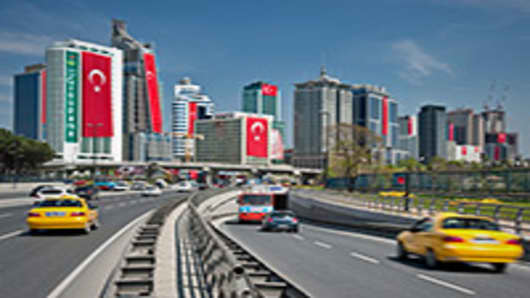The chairman of Sabanci Holding, one of Turkey’s most powerful family-run conglomerates, said no decision had yet been made on the fate of its joint venture with Europe’s largest retailer, Carrefour.
In an exclusive interview with CNBC’s “Access: Middle East”, Guler Sabanci underscored that its JV in Turkey, CarrefourSA, had not lived up to expectations.
“We should not destroy value; we are here to create value. We are not happy with the performance of our joint venture and they are not happy with the performance,” she said. "I'm sure we will find an amicable solution."
In a surprise move in July, Haluk Dincer, who is also president of Sabanci's retail and insurance arm, resigned from the board together with three other directors, citing a lack of “necessary support and assistance” from Carrefour.
The Turkish giant hired Rothschild earlier this year to advise on strategic options for its stake in CarrefourSA. A decision is not expected before the end of 2012.
Sabanci Holding owns 38.8 percent of the venture, and Carrefour holds 58.2 percent. The remainder of shares is publicly traded on the Istanbul Stock Exchange (ISE).
In terms of performance so far this year, the stock has not been able to match the ISE’s benchmark, but has still appreciated almost 22 percent in value.
There are several options Sabanci Holding could pursue, such as buying Carrefour’s stake, or selling its own.
Carrefour CEO Georges Plassat revealed last month that operations in emerging markets such as Indonesia and Turkey were indeed under review.
In a research note on August 31, Erste Group Bank maintained that one scenario in particular stood out.
“Our most likely candidate for being an acquirer is Sabanci Holding as the company already has 39 percent exposure in the company and they name retail sector as one of their core businesses,” the note read.
An expanding economy pushing up per-capita incomes for the predominately young population has created an enticing retail market.
Turkey was home to the fastest growing G20 economy second only to China last year, and has thus far been successful in engineering a soft landing, despite torrents of skepticism over policies in recent years.
The Organization for Economic Cooperation & Development (OECD) sees GDP growth at 3.3 percent this year.
Sabanci, who is currently among the world’s 100 most powerful women in a ranking by Forbes, made it clear that when it came to reducing the country’s current account deficit, the frequently-cited Achilles’ heel, citizens would need to do their part.
“I think as Turks, as Turkey, we have to save more. We have to learn to save more…It may sound contradictory to the business I am in. But we have to be fair if we are here for the long term,” she said.
The European Union is Turkey’s biggest trading partner and trade volumes have already taken a hit as many companies seek to diversify in case the continent’s debt troubles deepen.
A quick check on the numbers shows the share of exports that go to EU countries fell from 48 percent to 39 percent last year.
Sabanci herself remained positive about the likelihood of what she described as essential “united fiscal discipline” to support the euro.
“But that is easier said than done,” she admitted. “There is a serious lack of leadership we see in Europe. I’m hoping that somehow this will be corrected”.
Catch the full interview, more on why Sabanci is convinced Turkey’s EU bid is not lost, and how family conglomerates can serve as successful business models in the 21st century, on this week’s “Access: Middle East”.
Yousef Gamal El-Din is CNBC's Middle East Correspondent and contributes to the channel’s flagship shows, as well as analysis for CNBC.com.
Stay in touch with him on Twitter at http://www.twitter.com/youseftv @youseftv


